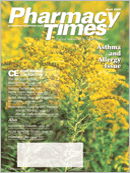Publication
Article
Pharmacy Times
Compounding for Vaginal Conditions
Author(s):
Many women experience vaginalproblems of some type atvarious points in their life. Forsome women, these problems tend tooccur almost chronically and may beresistant to a number of treatments. Otherwomen begin to experience problems,such as vaginal dryness, more frequentlyas they approach menopause and thehormonal changes that accompany it.When traditional treatments fail, compoundingpharmacies can be a valuableresource for patients suffering from vaginalconditions, such as recurrent yeastinfections and chronic vaginal dryness.
Yeast infections (or genital candidiasis)can occur at any age, and 3 of every4 women will experience a yeast infectionat some point in their lifetime.Approximately 5% of women sufferfrom recurrent or chronic yeast infections.These infections may be morecommon after a round of antibiotics,because this type of therapy may disturbthe normal balance of vaginal flora,allowing an overgrowth of yeast. Somewomen may be slightly more prone toyeast infection during or closely followinga pregnancy or while taking oralcontraceptives, due to the high levels ofestrogen present in the system. Womenwith diabetes also appear slightly moreprone to yeast infections.1
For those who suffer from recurrentyeast infections, it is not unusual for aninfection to become resistant to thecommonly used antifungal treatmentsavailable by prescription or over thecounter. In such cases, a compoundingpharmacist may be of help with certaintherapies, which can both treat theinfection and prevent the recurrence ofcandidiasis.
For example, boric acid vaginal capsules(generally 250-600 mg) or suppositoriesmay be used on a once- or twice-dailybasis for 7 to 14 days to treat thecondition. They also can be used asmaintenance therapy, with a smaller orless frequent dose.2,3 Another compoundedtreatment for an active yeastinfection, which can be used in conjunctionwith boric acid vaginal therapy, istopical Peri-Wash, containing boric acid,menthol, and phenol. It is used tosoothe the symptoms of itching andburning that often are present. These 2treatments represent just a sampling ofcompounded options available to treatvaginal yeast infections.
A frequent complaint of many womenis vaginal dryness and discomfort, whichis particularly common in women nearingmenopausal age or in transitionalperiods, such as following the birth of achild. The decrease in estrogen levelscan lead to thinning of the vaginal tissues.This condition may cause painfulintercourse and can be difficult to treat.With so many new warnings about hormonereplacement therapies in the lastcouple of years, many women are hesitantabout using synthetic hormones totreat symptoms such as vaginal dryness.More and more women are exploringnatural or bioidentical hormone replacementto treat these and other symptoms,because these hormones are not asstrong as many of their synthetic counterparts.Additionally, because they arenatural to the human body, many expertsfeel that they pose a lower risk of cancerthan do synthetic hormones.4
Compounding pharmacies can preparevaginal creams using bioidenticalhormones that may clear up chronicvaginal dryness and restore elasticity. Acommon preparation for treating thisspecific condition is a vaginal cream containingestriol, which, for these purposes,is often prescribed in a 0.5% to 1% dose.Estriol is a weak bioidentical estrogenthat is produced in particularly highamounts during pregnancy. In topicalform, it has a pronounced local effect onthe estrogen receptors in vaginal tissue.Some experts also feel that estriol vaginalcreams can improve the symptomsof incontinence and the frequent urinarytract infections that are common as awoman approaches menopause.4,5
For women who have not had successwith more traditional therapies, a compoundingpharmacy may be the key torestoring vaginal health. Conditions suchas recurrent yeast infection and vaginaldryness may be effectively relieved withcompounded treatments, such as theexamples mentioned above. It is importantto remember that compoundingenables a physician to tailor treatmentspecifically to the needs of the individualpatient, with more options than commercialmedicine allows.
Ms. Fields is with the InternationalJournal of Pharmaceutical Compoundingand is a pharmacy technicianat Innovative Pharmacy Servicesin Edmond, Okla.
For More Information
The International Journal ofPharmaceutical Compounding(IJPC) is a bimonthly scientific andprofessional journal emphasizinghigh-quality pharmaceutical compounding.The journal covers topicsrelevant and necessary toempower pharmacists to meet theneeds of today's patients. For moreinformation, or to subscribe toIJPC, visit www.ijpc.com, or call888-588-4572.
For a list of references, send astamped, self-addressed envelope to:References Department, Attn. A. Stahl,Pharmacy Times, 241 Forsgate Drive,Jamesburg, NJ 08831; or send an e-mailrequest to: [email protected].

Newsletter
Stay informed on drug updates, treatment guidelines, and pharmacy practice trends—subscribe to Pharmacy Times for weekly clinical insights.






